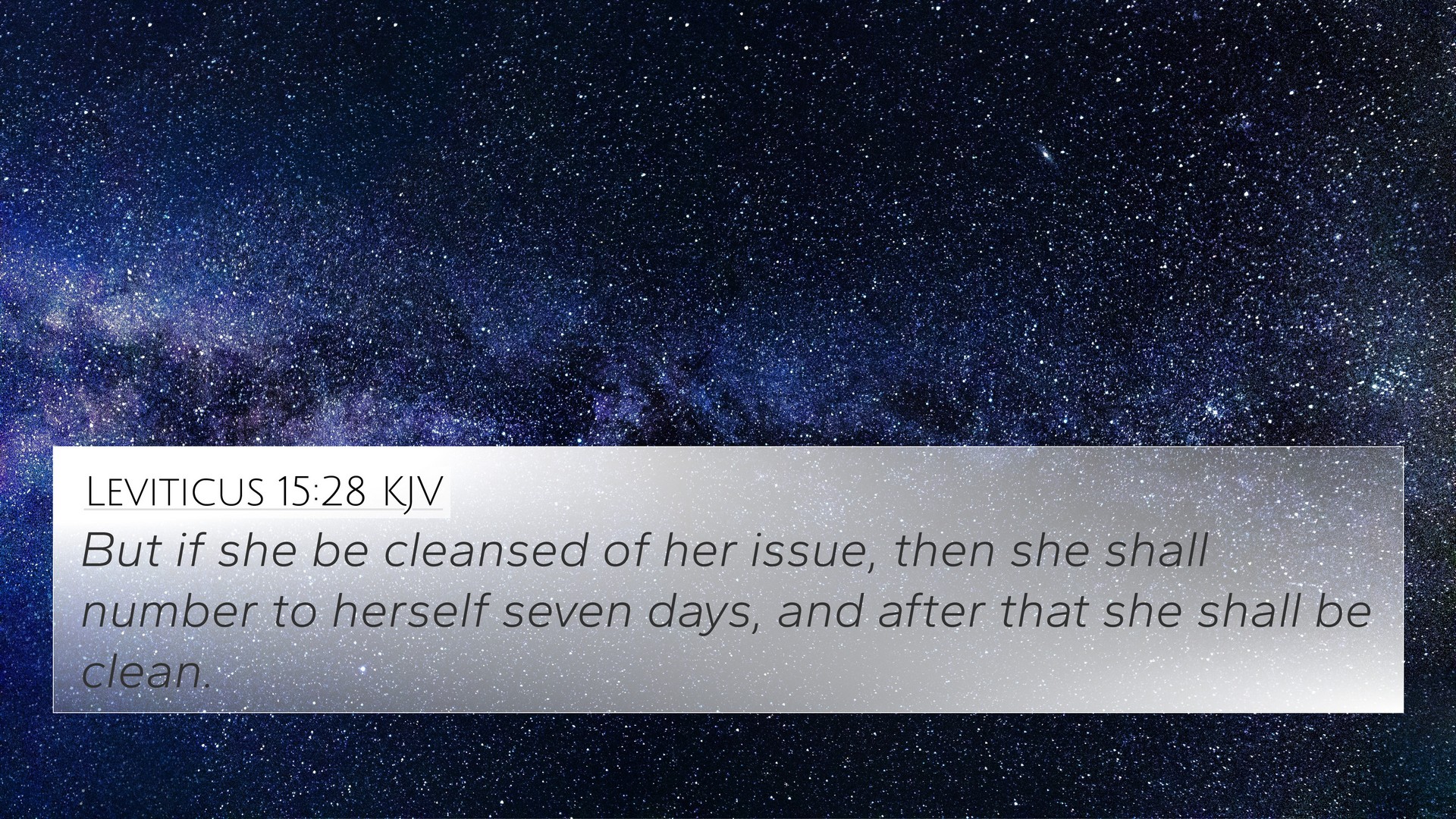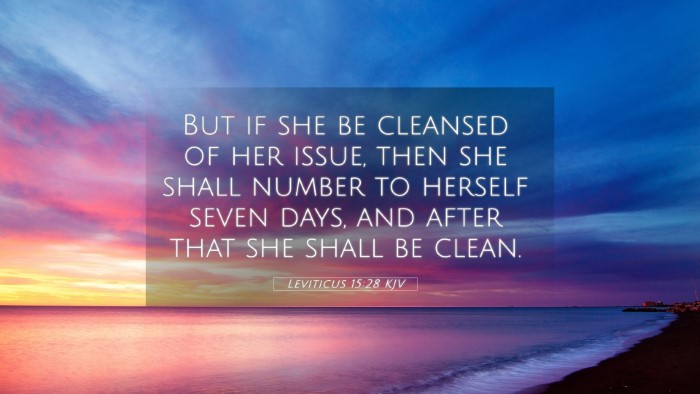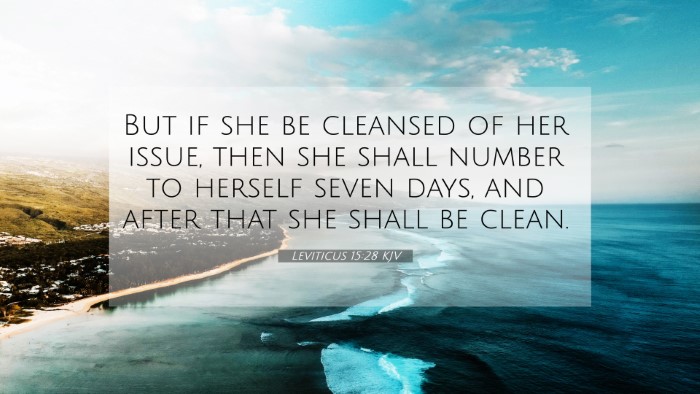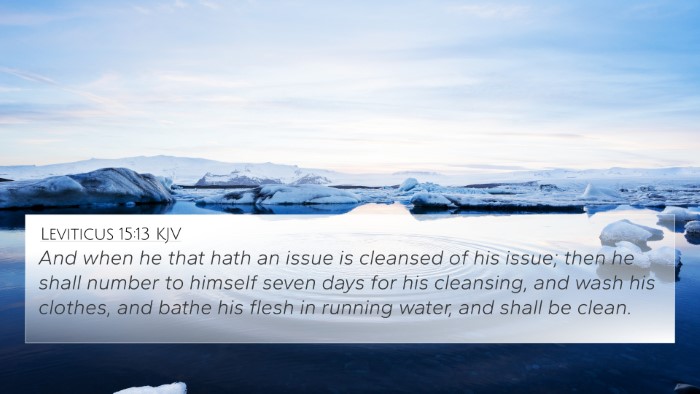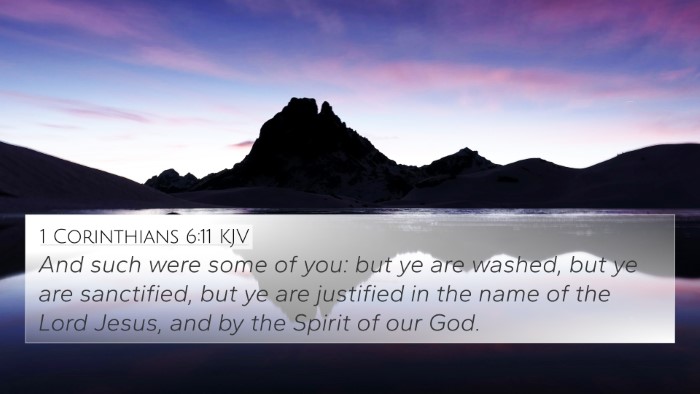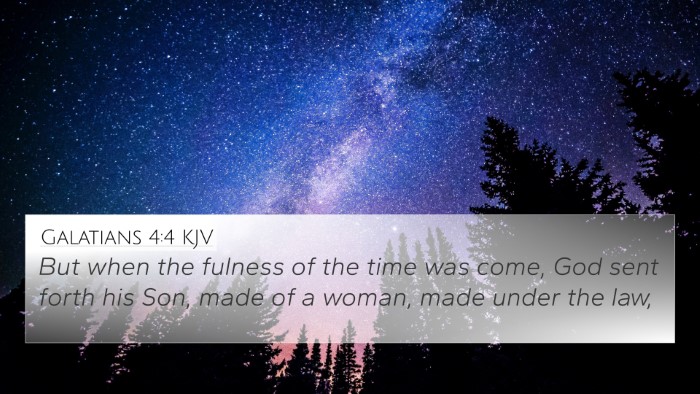Understanding Leviticus 15:28
Leviticus 15:28 states: "But if she is cleansed of her discharge, then she shall count for herself seven days, and after that she shall be clean." This verse is part of the laws concerning bodily discharges, which outlines the purification process for a woman after experiencing a discharge. The context of this law attempts to delineate the cleanliness of individuals based on their bodily conditions and how these affect their community and worship.
Summary of Insights
Public domain commentaries offer various interpretations of Leviticus 15:28. The insights from prominent theologians like Matthew Henry, Albert Barnes, and Adam Clarke provide a deeper understanding of its implications.
Matthew Henry's Commentary
Matthew Henry emphasizes the importance of ritual purity in approaching God. He notes that this regulation serves not only as a health directive but also as a means to maintain holiness within the community. The seven days prescribed for purification reflect a complete cycle of renewal and restoration, allowing the individual a time to reflect on their condition and seek spiritual cleansing.
Albert Barnes' Commentary
Albert Barnes expands on the idea of ceremonial purity and its significance in the lives of the Israelites. He explains that the seven-day period marks a transition from a state of being unclean to becoming clean, highlighting the importance of time in the purification process. Barnes connects this with broader themes of reconciling with God, whereby the community is reminded of the holiness required to be in fellowship with God.
Adam Clarke's Commentary
Adam Clarke looks at the practical implications of this law, considering its relevance to health and community life. He points out that these laws were not merely ritualistic but were also tied to physical well-being. The enforced period of cleansing allowed for societal healing and the reintegration of individuals back into community life after experiencing discharges, which are portrayed as significant disturbances in one’s bodily health.
Related Bible Verses
This verse connects with various other scriptures that emphasize themes of purity, cleansing, and community health. Here are some key Bible cross-references:
- Leviticus 11:47 - Discusses the distinction between clean and unclean animals, reflecting broader themes of purity.
- Leviticus 12:2-4 - Provides similar instructions concerning the purification of a woman after childbirth, emphasizing ritual cleanliness.
- Romans 12:1 - Invites believers to present their bodies as a living sacrifice, which resonates with the overall theme of holiness.
- 1 Corinthians 6:19-20 - Highlights the idea of the body as a temple, underscoring the importance of purity.
- Hebrews 9:13-14 - Discusses the blood of goats and bulls and the necessity of a greater cleansing through Christ.
- Isaiah 1:16-17 - Calls for a cleansing from sin, connecting physical and spiritual purity.
- James 4:8 - Encourages the act of cleansing hands and hearts, linking personal purity with spiritual integrity.
- 2 Corinthians 7:1 - Speaks about purifying oneself from everything that contaminates body and spirit.
- 1 John 1:9 - Offers assurance of forgiveness and cleansing when we confess our sins, relating to the theme of restoration.
- Psalms 51:7 - David pleads for purification and cleansing, echoing the themes of repentance and restoration.
Thematic Connections and Cross-Referencing
Understanding Leviticus 15:28 involves recognizing its thematic connections to other Bible verses about purification and cleanliness. The principle of being made clean before God is a consistent theme throughout the Scriptures. Through cross-referencing Biblical texts, one can see how various passages emphasize the necessity of purity in both physical and spiritual contexts.
Tools for Cross-Referencing
Utilizing a Bible concordance or Bible cross-reference guide can enhance your study of these connections. These tools help identify links between verses and support a more comprehensive understanding of how themes circulate throughout the Bible. Some effective methods for cross-referencing Bible study include:
- Using a Bible cross-reference system for systematic study.
- Implementing cross-referencing Bible study methods such as thematic studies.
- Consulting bibliographic resources that compile connections and themes.
- Engaging in inter-Biblical dialogue by comparing Old Testament laws and New Testament applications.
Conclusion
The study of Leviticus 15:28 reveals much about the importance of purity, community, and the process of returning to a state of cleanliness before God. By considering the cross-references and insights from various commentaries, readers can grasp the deeper implications of this verse and apply its teachings regarding spiritual and physical integrity.
Further Study Suggestions
For a richer understanding, consider the following:
- Investigating how the laws of cleanliness in Leviticus relate to the teachings of Jesus in the Gospels.
- Comparing the purity laws of Leviticus with New Testament teachings on grace and purity.
- Exploring the cultural and historical context of the Israelites' understanding of bodily discharges and cleanliness.
- Examining the connections between Old Testament prophecies about cleansing and their fulfillment in Christ.
- Studying the impact of purity laws on community worship and individual relationships with God.
